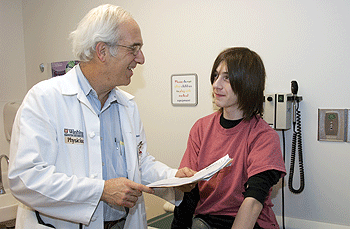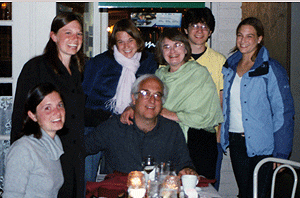They simply call him “Dr. Bob.” Referring to him in a more familiar style is a testament to how comfortable Robert J. Rothbaum, M.D., professor of pediatrics and clinical director of the Division of Pediatric Gastroenterology and Nutrition, makes his patients feel. That comfort is important with children who have sometimes uncomfortable or embarrassing problems such as constipation or diarrhea.
The same demeanor also makes him popular with first-year medical students who are adjusting to their new setting.
Rothbaum divides his 25-year tenure at the School of Medicine into three “careers.” His first career focused on cystic fibrosis, and his second career centered on gastroenterological disorders.
His third — and current — career is teaching medical students and working with the Department of Pediatrics and St. Louis Children’s Hospital in programmatic matters. He continues to direct the clinical activities of the division and sees about 20 patients a week.
Cystic fibrosis is an inherited chronic disease that affects the lungs and digestive systems of about 30,000 children and adults in the United States, but physicians previously focused on treating malnutrition as well as its effect on the lungs, Rothbaum says.
The disease prevents pancreatic enzymes from helping the body break down and absorb food, so gastroenterologists were the main physicians to treat the disease.
However, when physicians began giving patients enzymes to help digest food, the main focus of the disease shifted to lung function and pulmonology.

“It became clear to me that being a non-pulmonologist treating cystic fibrosis was probably not optimal,” Rothbaum says with dry wit. “With rapid advances in treating chronic lung disease and the advent of lung transplantation, the best interest of the patients and families required a sophisticated pulmonary-based leader.”
That’s when Rothbaum moved into his role as clinical director of the pediatric gastroenterology and nutrition division, a post he has held since 1992.
Caring for children
Rothbaum says what he likes about gastroenterology is that he sees a lot of patients who have gastrointestinal symptoms, such as abdominal pain, constipation or trouble swallowing, but many times those symptoms represent other disorders.
“The challenge is to identify if a serious disorder is present and if so, is it a GI problem, a metabolic disorder, a neurologic illness or a functional syndrome?” he says. “GI symptoms can interfere with life in a big way, and we have to help patients through that.
“When we do diagnose and treat a chronic GI illness like inflammatory bowel disease, we work with the families to enable children to do everything that children without these problems do,” he says. “We work hard to minimize limitations imposed by the illness.”
That strength of purpose shines through in Rothbaum’s long-time work with the Crohn’s & Colitis Foundation of America. In gratitude for his involvement and support, the foundation named him Physician of the Year in 1998.
Rothbaum serves as the main pediatric medical resource for the Mid-America Chapter, giving talks, attending youth support-group meetings, serving on its medical advisory committee and board of trustees and acting as medical director for the foundation’s Camp Oasis, held each summer at YMCA Lake of the Ozarks for about 50 children ages 8-17 with inflammatory bowel disease.
“Dr. Bob has been very instrumental in sending kids to our camp,” says Jan Baron, executive director of the Mid-America Chapter. “He’s fabulous with the kids — he takes them fishing, plays basketball with them and encourages them all the way in every activity — and they love him. He doesn’t take any nonsense from anybody — he tells it like it is, but he’s gentle with it.”
Caring for students
His no-nonsense yet easygoing at-titude also carries over to the first-year medical students he teaches in “The Practice of Medicine I” course, for which he has been coursemaster since 2002. Roth-baum says he spends about 40 percent of his time on medical student education, which includes designing a dynamic curriculum and meeting with students.
“This is a tough course,” he says. “We set our goals high, help students learn the best ways to communicate with patients, listen with a professional ear, analyze clinical data, consider ethical di-lemmas and delve into interactions between medicine and society. Designing dynamic, patient-based educational methods is exciting because the students learn the techniques and information so quickly.
“In the course, some of the students may come to me and say they didn’t like a session,” he says. “So I’ll say: ‘Let’s sit down and think about that. What wasn’t so good about it, and how would you like it to be different?'”

The students helped design the curriculum for several sessions in the course, including one on complementary and alternative medicine, another about sexual orientation and identity and taking patient histories and a third about palliative medicine.
Ariel Lyons-Warren, a first-year student, says Rothbaum has been “incredibly responsive” to the students’ suggestions for the course.
“He has done an amazing job of revamping ‘The Practice of Medicine I’ course in response to student comments and has made an effort to get to know all the students, including inviting us in small groups to his home for dinner,” Lyons-Warren says. “He also is very active — my favorite aspect of his lectures is that he has this habit of pacing on the stage when he’s trying to think how to explain or answer a question.”
Rothbaum received the Samuel R. Goldstein Leadership Award in Medical Student Education in 2004, an award from his peers, and his students praise him for his patience, graciousness and always providing a listening ear.
Bringing out the best
Although Rothbaum’s three “careers” seem varied, he says they re-inforce each other.
“Each area has its potential to support and invigorate the others,” he says. “When the medical students come to the office to see what I do, then I have to be especially sharp that day,” he says with a laugh.
Phillip I. Tarr, M.D., the Melvin E. Carnahan Professor of Pediatrics, professor of molecular microbiology and director of the pediatric gastroenterology and nutrition division in the Department of Pediatrics, notes Rothbaum’s generosity with his time.
“Bob has multiple attributes — he is energetic, ethical, perceptive and idealistic,” Tarr says. “By words and most importantly by deeds, he is immensely critical to the functioning of our group, from office staff to all of our faculty. He brings out the best in all around him.”
Rothbaum is president-elect of the Medical Staff of St. Louis Children’s Hospital, a term that will lead to two years as president of the organization, which deals with hospital policy, bylaws and “making sure things are running like they are supposed to,” he says. One of his recent accomplishments was helping develop a specialized electronic order-writing system for intravenous nutrition.
A native of Indianapolis, Rothbaum earned a bachelor’s degree from Brown University and a medical degree from the University of Chicago. He completed a pediatric residency and fellowship in ambulatory pediatrics at St. Louis Children’s Hospital, then completed a fellowship in pediatric gastroenterology and nutrition at Children’s Hospital Medical Center in Cincinnati.
He joined the School of Medicine faculty and St. Louis Children’s Hospital in 1982.
Rothbaum and his wife, Cynthia, have five children ranging in age from 20 to 28. Because three children live in New York and two live in Colorado, the Rothbaums’ main hobby is traveling to visit family, he says.